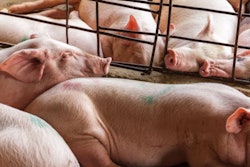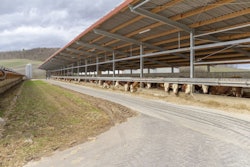
As the Balkan state reported its first ever cases of African swine fever (ASF), further cases have been confirmed in domestic pigs in Bulgaria, Poland, Romania, and Russia.
Over the whole of 2021, 1,874 ASF outbreaks in domestic pigs were confirmed in 11 European states. This is according to the Animal Disease Information Notification System administered by the European Commission (EC). During the previous year, 12 countries recorded a total of 1,240 outbreaks through this system.
Of the 2021 total, 1,676 outbreaks occurred in Romania, and 124 in Poland. Other countries reporting cases to the EC were Serbia (33 outbreaks), Ukraine (13), Slovakia (11), Bulgaria (6), Germany (4), two each in Italy, Latvia, and Moldova, and one in Estonia.
Among wild boar, there were 12,150 outbreaks in 12 European countries, according to the EC. The previous year, 14 states recorded a total of 11,027 outbreaks in this population.
Registering the most outbreaks in wild species last year was Poland (3,221). This was followed by Hungary (2,584), Germany (2,525), Slovakia (1,671) and Romania (1,059). Outbreaks also occurred in Latvia (368), Bulgaria (318), Lithuania (244), Estonia and Serbia (each with 71), Italy (15) and Ukraine (3).
First ASF cases in North Macedonia
The southeastern European state officially registered its first ever outbreak of ASF this month. According to the notification to the World Organisation for Animal Health (OIE), affected was a backyard herd of 18 pigs in Delcevo. This municipality is in the east of the country, and borders Bulgaria.
As of January 16, this outbreak in North Macedonia was one of the 24 in domestic pigs to have been recorded with the EC system so far this year. Romania has already confirmed 22 outbreaks, and Bulgaria, one.
Over the past two weeks, 17 new ASF outbreaks were confirmed to the OIE by Romania’s veterinary authority. Of these, one was at a farm with more than 3,200 pigs in the southern county of Giurgiu. Also testing positive for the ASF virus were a pig carcass found dumped in a public place, and backyard herds across eastern, southern and central Romania.
Poland’s animal health agency has retrospectively registered with the OIE three ASF outbreaks in domestic swine. With between 34 and 135 animals, the virus was detected in November in Holy Cross (Swietokrzyskie). Each premises was described in the report as a “farm.” This province is located in central-southern Poland.
In 2021, the country’s 124 confirmed ASF outbreaks in domestic pigs directly involved 42,248 animals, according to the Poland’s chief veterinary office. Nine of the affected premises had herds of least 1,000 pigs. Worst affected province was Subcarpathia (Podkarpackie). Located in the southeast of the country, this province accounted for 45% of the reported outbreaks.
ASF situation in eastern European swine
In two regions of Ukraine, the ASF situation has been “resolved,” according to latest OIE reports. This came after a single confirmed outbreak in one backyard herd in the central region of Kirovohrad, and in Kherson in the south of the country. These occurred in November and early December 2021, respectively.
ASF has re-emerged this month in Russia’s Samara region after a two-month hiatus. According to the official report to the OIE, two out of seven animals in a backyard herd showed signs of the disease. Samara is part of the Volga federal district.
Meanwhile, ASF has been reported “resolved” in eight Russian regions. These cover the following federal districts: Central (Belgorod, Bryansk, Kaluga, and Lipetsk regions), Volga (Orenburg, Perm, and Saratov), and Northwestern (Novogorod).
Outbreaks in European wild boar approach 600
As of January 16, the EC animal disease system was registering 565 outbreaks among wild boar in 10 European countries.
Recording the most outbreaks so far has been Poland (177), followed by Bulgaria (120), Germany (78), Romania (59), Slovakia (46) and Latvia (43). Estonia, Italy, Hungary and Lithuania also registered cases this month.
In Germany, the number of ASF cases in wild boar has risen to 3,220. This figure covers all cases in the wild population since the first case in September 2020.
The total comprises 2,357 in the eastern state of Brandenburg (as of January 21), 854 in neighboring Saxony (as of January 18), and nine in Mecklenburg-West Pomerania. All three states are in the east of Germany, and border Poland.
ASF spreads to new region in Italy
At the start of January, first cases of ASF were confirmed by the Italian authorities in the northwestern region of Piedmont. By January 17, the number of cases testing positive for the virus there has risen to 13, based on OIE reports. These animals were found at different locations in the same province, Alessandria.
On January 13, two wild boar tested positive for ASF in Genoa province, which is in the neighboring region of Liguria. Although ASF has been regarded as endemic on the Italian island of Sardinia, these were the first cases in Liguria.
Authorities in Italy are increasing controls to prevent further spread of ASF.
According to the agriculture ministry, hunting has been banned in many communities in Alessandria. To the south of Liguria, passive surveillance of the health of wild boar has begun in the region of Tuscany. Furthermore, authorities there are seeking funding to begin the construction of fences to restrict the movements of wild boar. Even in the southern region of Campania, preparations are being made to protect native breeds, such as black Casertana pigs.
Call for support for the EU pig sector
ASF was among the issues discussed at the meeting of the European Union (EU) Agriculture and Fisheries Council meeting in Brussels last week.
After the agriculture minister of France presented the key priorities for the forthcoming French presidency, the minister of the Czech Republic called on the European Commission to take urgent action to support EU pig producers. Together with the COVID-19 pandemic and rising feed prices, ASF has contributed to a long-running and deepening crisis for the pig meat sector, according to the Czech delegate.
View our continuing coverage of the global African swine fever situation.

















